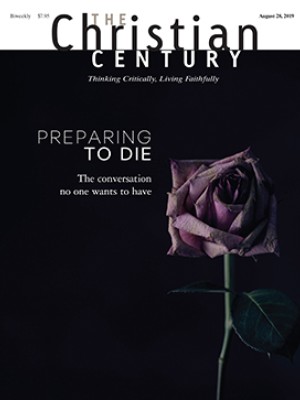Nuns and Nones helps millennials find surprise soul mates
The Dominican sisters sat in silence, eyes closed, palms upturned, couches and chairs pushed together into a circle in the room at the Dominican Center at Marywood in Grand Rapids, Michigan.
Their reading that evening came not from scripture but from poet Mary Oliver: “Though I play at the edges of knowing, / truly I know / our part is not knowing, / but looking, and touching, and loving.”
The candle flickering in their midst didn’t invoke a saint but rather author and activist James Baldwin.
Joining the Catholic women religious in contemplation was a group of young women who aren’t sure they’d describe themselves as religious in any sense.
The Sunday night meeting, known as Sisters and Seekers, is one of about a dozen gatherings across the country affiliated with Nuns and Nones, a growing alliance connecting Catholic women religious, most of whom are over 60, with millennials in their twenties and thirties, many of whom identify as religious nones.
Katie Gordon, a member of Nuns and Nones’ operational team, described the group as an experiment in “different sort[s] of forms of what community can look like and what action can look like today.”
“We know that there [is] a much larger moment of reinvention and spiritual life that we’re a part of,” she said.
Both Sisters and Seekers and Nuns and Nones started in 2017 and quickly connected with each other, according to Gordon, who cofounded the Grand Rapids group. Neither had a mission per se, she said, just a curiosity about what would happen if women religious and millennials came together.
Read our latest issue or browse back issues.
Gordon, who identifies herself as agnostic, said she first met the Dominican sisters in Grand Rapids through her interfaith organizing work. She’d often see the sisters marching at protests. As she got to know some of the sisters one on one, she began to see the possibilities for building relationships between them and her fellow millennials.
Gordon had been raised Catholic, but she felt that the sisters she met represented a different Catholicism from what she had known, she said.
“It’s really ironic and also beautiful to be able to engage with the tradition that I was raised in, but in a totally new way,” she said.
Gordon invited a handful of millennials to those first meetings. Sister Barbara Hansen of the Dominican Sisters, now a sister collaborator with Nuns and Nones, gathered the sisters.
The two groups started meeting together in the evenings for about two hours, usually at the Dominican Center, a brick building sitting on a lush, green campus with a sculpture garden and a sign on the lawn reading, “In this house, we believe: Black lives matter, no human is illegal, science is real, love is love, kindness is everything.”
Meanwhile, Nones and Nuns was hosting its first gatherings of about 20 people—half sisters, half millennials—for two-day retreats in Cambridge, Massachusetts.
Since then, those gatherings have spread across the country. While the gatherings may look different, they all revolve around the same question, Gordon said: “What can these two groups learn from each other?”
Gordon believes women religious and millennial women have more in common than might meet the eye. Both are interested in community, in social justice, and in asking hard questions about faith and spirituality.
“Any conversation with a sister is a master class in building community,” said Gordon. “We millennials have so much hunger for spaces of community, belonging, meaning, depth, and we aren’t finding that in our social media. We aren’t finding that often as we move city to city. And so to be able to find that with these Catholic sisters who hold wisdom of their traditions from centuries is a gift for us to be able to translate that into our own life.”
Hansen, 80, said the women religious find their faith deepened by the millennials in the group.
“I’m deeply impressed with their goodness,” she said. “I’m deeply impressed with their wanting to make the world a better place, with their questions, with what they’re seeking. That’s not any different from what I’m seeking or we’re seeking.”
There’s no proselytizing at the meetings. And the sisters aren’t looking for their millennial friends to join their order or to seek out a religious vocation. Instead, they want to build bridges between beliefs and generations, something Gordon calls “a welcome antidote for our time.”
“To see seemingly two groups that might be very different actually come together and find so much in common is one thing that resonates,” she said.
Discussions at Sisters and Seekers meetings often center on what’s happening in the world and how to “stay healthy and centered and respond in effective ways,” said Ellie Hutchison, one of the organizers.
In the past, that’s included everything from conversations about the existence of God and the afterlife to discussions about consumerism and capitalism, she said.
The group isn’t afraid of difficult conversations or of talking through their disagreements.
One discussion several months into the group’s meetings about queer identity and the Catholic Church left some feeling hurt or misunderstood. The sisters and their millennial friends ran headlong into some generational differences around the topic.
But even that helped the group develop conversation guidelines as they continued to engage in difficult topics.
“I just so appreciate the sisters’ spirit because they are just generally so curious in getting to know us and hearing about our experiences and our thoughts on different issues. That curiosity is something that I haven’t often encountered with people who are several decades older than me,” said Hutchison, who is 26.
“Even though we have different ideological beliefs on certain issues, it still is the place that, when I leave, I feel refreshed and more connected and more encouraged and hopeful than when I came, which is just, I think, the greatest gift,” she said. —Religion News Service





